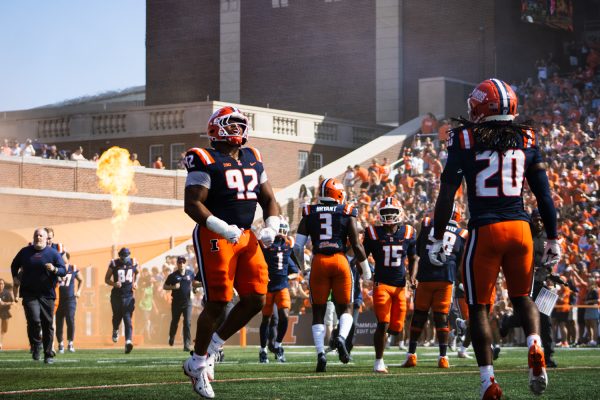COLUMN: Bad choices add up for Illinois
Oct 9, 2006
Illinois got a taste of its own medicine on Saturday when Indiana ruined Illinois’ 96th homecoming weekend. A blowout quickly turned into a close game then transformed into a loss in a blink of an eye when Austin Starr kicked a last second 33-yard game-winning field goal.
But what if freshman tight end Jeff Cumberland hadn’t dropped a deep pass from fellow freshman Juice Williams midway through the fourth quarter? Would this have changed the tempo of the rest of the game?
This is one of Illinois’ more acceptable mistakes of the game considering Cumberland is a freshman.
But what if Illinois refused to kick to Indiana running back Marcus Thigpen – a mistake that should anger any Illini fan? His kick returning stats would make Kansas City Chiefs returner Dante Hall envious. Thigpen returned one kickoff 98 yards for a touchdown and that’s not even his longest this season. Through six games and 13 kick returns, Thigpen has tallied 543 yards for a 41.3 yard average and scored three touchdowns. His longest return: 100 yards. How was this not a part of Illinois’ game plan?
After Thigpen gave the Illini a scare early in the second quarter when he returned a kickoff 60 yards before Jason Reda pushed him out of bounds, it seems as if head coach Ron Zook should have told Reda to kick it to anyone else on the field, but that’s just me. Good thing Illinois started to do that after Thigpen returned one for a touchdown.
Get The Daily Illini in your inbox!
But what if head coach Ron Zook was as conservative with points as he was with his play calling in the second half? What if instead of going for a two point conversion on two consecutive scoring drives, he kicked the extra point? Jason Reda is relatively automatic on extra points and those extra two points would have sent the game into overtime. I’d take my chances in overtime at home on homecoming.
To give Zook credit, he did call two other trick plays resulting in 12 points – yes, 12 points, not 14. But the coaching staff has to minimize, not maximize the team’s mistakes – especially with such a young and inexperienced team. What’s the purpose in going for a two point conversion in what seemingly looked like a blowout win?
Illinois’ offense looked unstoppable in the first quarter, jumping out to a 15 point lead that should have been 17. Those two points were the difference in the game. Zook can deny it all he wants, saying the two failed conversions did not make a difference in play calling or his team’s confidence, but it certainly looked as if it did.
After both attempts failed, the Illini offense looked completely different. Before the play, Illinois had amassed 252 yards of total offense and scored on four consecutive drives. In the other three quarters, the Illini played conservatively, collecting just 174 total yards and 10 points.
A potent offense turned weak and feeble. Instead of playing to win, Illinois was scared, playing not to lose. Those two plays looked like it had a greater effect than just what the scoreboard showed.
From the team’s confidence in the offense to the environment in Memorial Stadium, those two failed conversion could have completely changed the outlook of the game.
But what if Illinois had won this game? Would this Illini team have ridden the wave from two consecutive Big Ten wins to a Bowl game in December? Illinois fans will never know thanks to Zook’s questionable calls.
Troy Murray is a junior in Communications. He can be reached at [email protected].





